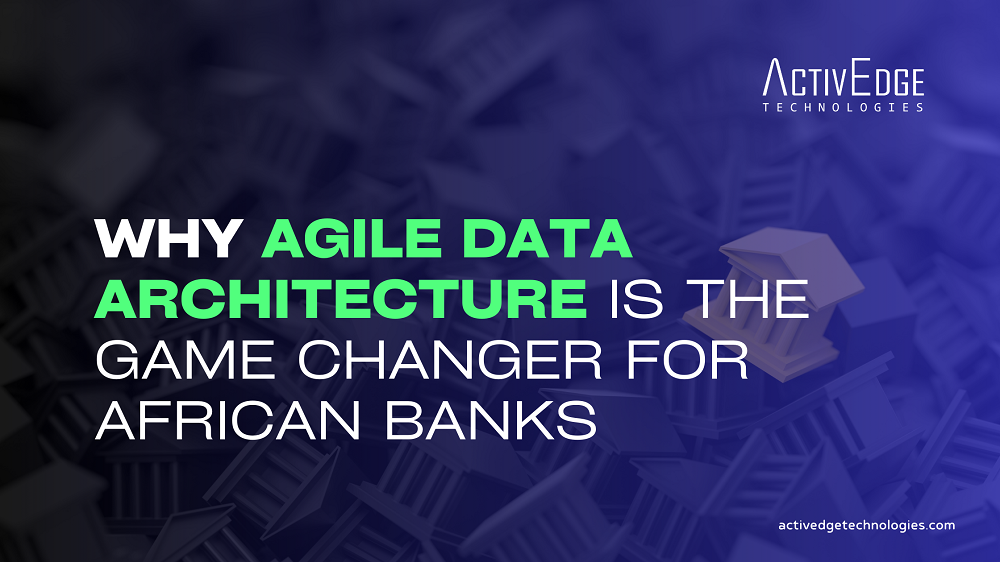Building the Future: Why Agile Data Architecture is the Game Changer for African Banks
Picture this: a bustling financial institution in Lagos. Customers are transacting online, branches are buzzing with activities, and data is pouring in from multiple channels—mobile apps, ATMs, payment systems, and even social media. Somewhere within this sea of information lies the key to transforming customer experiences, innovating new products, and gaining a competitive edge. But without a clear strategy and agile data systems, all this data becomes a liability instead of an asset.
This scenario is not uncommon in banks across Nigeria, West Africa, and East Africa, where financial institutions grapple with the challenges of turning raw data into actionable insights. The solution? An agile data architecture that serves as the foundation for sound data quality, governance, analytics, and advanced capabilities like AI and machine learning.
Let’s explore how an agile data strategy can help financial institutions overcome challenges, unlock growth, and stay ahead in a rapidly evolving digital landscape.
Data: The Foundation of Financial Transformation
In the banking sector, data is often referred to as the “new oil.” Yet, much like crude oil, it needs refining before it can fuel innovation. Without robust data governance and quality measures, data becomes inconsistent, siloed, and unreliable. The consequences? Poor decision-making, operational inefficiencies, and missed opportunities to serve customers better.
Agile data architecture addresses these pain points by enabling banks to:
Streamline Data Management: Consolidating fragmented data into a unified, virtualized layer for easy access and analysis.
Enhance Governance: Ensuring compliance with complex regulatory requirements such as Nigeria’s NDPR, while safeguarding customer privacy.
Enable Real-Time Analytics: Powering predictive insights to identify trends, risks, and opportunities as they emerge.
Support Advanced AI and ML Operations: Providing the clean, structured data needed to train sophisticated models for fraud detection, customer segmentation, and risk management.
Unlock Generative AI Potential: Laying the groundwork for AI-driven innovations, such as intelligent chatbots and personalised financial services.
WATCH WEBINAR: Four Must-Haves for Data Governance Success in Financial Services
The Cost of Inaction
Let’s return to our fictional bank in Lagos. Without an agile data system, every decision feels like a guessing game. Marketing campaigns miss the mark, fraud detection systems falter, and regulatory audits become a nightmare. Meanwhile, competitors with advanced data systems are deploying AI to predict customer needs, prevent fraud, and deliver hyper-personalized services.
For banks in Africa, the opportunity cost of not investing in data infrastructure is staggering. As global trends shift toward digital transformation, the time to act is now.
The Agile Data Advantage
An agile data architecture isn’t just about managing information; it’s about empowering institutions to:
- Innovate at Scale: Imagine launching a digital lending platform that uses real-time data to assess creditworthiness, extending financial access to underserved populations in remote areas.
- Deliver Predictive Insights: Predicting currency volatility or customer churn using machine learning models to make smarter business decisions.
- Enhance Fraud Prevention: Using data analytics to identify unusual patterns and block fraudulent transactions in real-time.
- Optimize Customer Experience: Providing personalized financial advice and services based on a deep understanding of individual customer needs.
Case Studies: Lessons from the Field
Transforming Digital Lending in East Africa
A leading East African bank faced challenges in extending credit to customers with limited financial histories. By adopting an agile data architecture, they integrated data from unconventional sources such as mobile payment platforms and social media, creating robust credit risk models. The result? An innovative lending product that boosted customer acquisition by 40%.
Fraud Detection in Nigeria
A Nigerian financial institution struggled to keep pace with sophisticated fraud schemes. With a streamlined data pipeline and advanced analytics, they reduced fraud detection times by 75%, saving millions in potential losses.
Personalized Banking in Ghana
A bank in Ghana harnessed agile data systems to clean up duplicate customer profiles across multiple channels. This enabled them to create 360-degree customer views, driving targeted marketing campaigns that increased product uptake by 30%.
The Strategic Framework for Success
Adopting agile data architecture is not a one-size-fits-all process. For financial institutions, it involves three critical steps:
- Data Quality as the Foundation: Poor data quality is the Achilles’ heel of advanced analytics and AI. Institutions must invest in tools and processes that ensure their data is clean, consistent, and complete.
- Data Governance as the Guardrail: Effective governance ensures compliance with local and international regulations while maintaining trust with customers.
- Data Virtualization for Agility: Instead of moving data physically, virtualization enables institutions to access and analyze data across silos in real-time, providing the speed and flexibility needed to innovate.
- Integration with AI/ML and Generative AI: Once the foundation is in place, financial institutions can build advanced capabilities like AI-powered customer segmentation, risk assessment models, and even intelligent chatbots that redefine customer interactions.
Looking Ahead
The financial sector in Africa is at a turning point. As digital banking adoption soars and customer expectations evolve, the institutions that prioritize agile data architecture will lead the charge. By investing in the right strategies and technologies, they can transform their operations, deliver innovative products, and position themselves as leaders in the digital economy.
The Final Piece of the Puzzle
For those ready to take the leap, the good news is that the tools to build this architecture are readily available. Solutions for data quality, virtualisation, and AI integration provide financial institutions with the capabilities needed to unlock the full potential of their data.
By taking the first step today, your institution can move beyond surviving to thriving in a competitive landscape. After all, in the world of banking, the smartest decisions are made with the best data. Isn’t it time your data worked as hard as you do?
Reach out to experts at ActivEdge Technologies to help you take the first leap.

